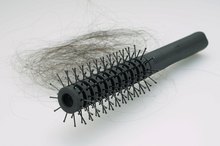Be Aware of the Side Effects of Choline and Inositol in Your Energy Drink
About 40 percent of athletes use performance-enhancing products like energy drinks, according to a March 2018 review in the International Journal of Sport Nutrition and Exercise Metabolism 131214. The makers of these products often hide obscure chemicals, like choline and inositol, in a long list of active ingredients. While such substances have health benefits, some of them may cause side effects.
If you are experiencing serious medical symptoms, seek emergency treatment immediately.
Read more: What You Really Need to Know About Supplements
Choline — Building the Basics
Dietitians consider choline an essential nutrient. It provides the raw material needed to build the basic chemicals of your body like acetylcholine. Disease and age can lower your circulating choline levels, according to a February 2013 article in the British Journal of Nutrition 3. This report suggests that choline may explain the age-related decline in performance and recovery.
Read more: Foods Rich in Choline
Choline — Supporting the Brain
Will Choline Help Me Lose Weight?
Learn More
An August 2017 review in Nutrients described the positive effects choline supplementation has on your brain. Increasing your choline levels during pregnancy also causes lifelong changes in your child's brain. The supplement can help offset damage caused by prenatal exposure to toxins like alcohol.
Read more: How to Take Inositol & Choline Supplements
Choline's Side Effects
A study in the November 2015 edition of the American Journal of Clinical Nutrition found that choline had benefits, but only one unwanted effect 4. Some participants noted a negative change in their body odor. Similarly, the authors of a July 2018 report in Alcoholism, Clinical and Experimental Research found only a single symptom. Their participants noticed a slight increase in feelings of nausea.
Inositol — Building and Signaling
Is it Safe to Take Inositol With an SSRI?
Learn More
Scientists classify inositol as a sugar alcohol. This role makes it an important building block in your body. For example, inositol contributes to cell development and growth. It also helps communicate signals throughout your entire nervous system.
Inositol — A Supplementing Star
An October 2016 review in Expert Opinion on Drug Metabolism and Toxicology described the amazing effects of inositol supplementation — from treating Alzheimer's disease in the elderly to easing respiratory distress in infants 7. Yet the most convincing evidence comes from studies testing inositol in women with ovary disease. Inositol can improve diabetes-like symptoms and restore fertility, according to a November 2018 paper in Trends in Endocrinology and Metabolism 8.
Inositol's Side Effects
A June 2018 review in Clinical Nutrition stated that participants taking inositol often reported an upset stomach 9. Yet your body naturally makes inositol. This fact keeps the side effects of inositol supplements low. Patients must take large doses before adverse events like hallucinations occur, according to an April 2018 report in Analytical and Bioanalytical Electrochemistry.
Choline, Inositol and Energy Drinks
Athletes use energy drinks to enhance their performance, and workers use them to increase their alertness. A January 2018 report in the Journal of the International Society of Sports Nutrition showed that commercially available drinks containing choline bitartrate increased muscular endurance and aerobic capacity in female recreational athletes 1.
Energy Drinks and Side Effects
A 2018 article in Food Research International described the potential health risks of energy drinks. The authors originally pinned caffeine as the culprit, but later research suggested that other substances may play a role.
A debate in the 2018 volume of the Anatolian Journal of Cardiology suggested inositol as a factor in supplement-related side effects 14. And choline causes nausea, one of the most commonly reported side effects of energy drinks. A 2018 report in the BLDE University Journal of Health Science found that 15 percent of energy drink users experienced nausea.
Related Articles
References
- International Journal of Sport Nutrition and Exercise Metabolism: Athletes and Supplements
- Nutrients: Neuroprotective Actions of Dietary Choline
- British Journal of Nutrition: Plasma Free Choline, Betaine and Cognitive Performance
- American Journal of Clinical Nutrition: Choline Supplementation in Children With Fetal Alcohol Spectrum Disorders
- Alcoholism, Clinical and Experimental Research: Feasibility and Acceptability of Maternal Choline Supplementation in Heavy Drinking Pregnant Women
- Advances in Experimental Medicine and Biology: Myo-Inositol Effects on the Developing Respiratory Neural Control System
- Expert Opinion on Drug Metabolism and Toxicology: Pharmacodynamics and Pharmacokinetics of Inositol(s) in Health and Disease
- Trends in Endocrinology and Metabolism: Inositol in Polycystic Ovary Syndrome
- Clinical Nutrition: Effects of Inositol on Glucose Homeostasis
- Food Research International: Caffeine-Based Food Supplements and Beverages
- Journal of the International Society of Sports Nutrition: Acute Effects of a Multi-Ingredient Pre-Workout Supplement on Resting Energy Expenditure and Exercise Performance in Recreationally Active Females
- Anatolian Journal of Cardiology: Energy Drinks and Obesity
- Chiappelli, J.; Rowland, L.; Wijtenburg, A. et al. Evaluation of Myo-Inositol as a Potential Biomarker for Depression in Schizophrenia. Neuropsychopharmacology. 2015;40(9):2157-64. DOI: 10.1038/npp.2015.57.
- Giordano, D.; Corrado, F.; Santamaria, A. et al. Effects of Myo-Inositol Supplementation in Postmenopausal Women With Metabolic Syndrome: A Prospective, Randomized, Placebo-Controlled Study. Menopause. 2011;18(1):102-4. DOI: 10.1097/gme.0b013e3181e8e1b1.
- Iuorno, M.; Jakubowicz, D.; Baillargeon, J. et al. Effects of D-Chiro-Inositol in Lean Women With the Polycystic Ovary Syndrome. Endocr Pract. 2002;8(6):417-23. DOI: 10.4158/EP.8.6.417.
- Levine, J.; Barak, Y.; Szor, G. et al. Double-blind, controlled trial of inositol treatment of depression. Am J Psychiatry. 1995;152(5):792-4. DOI: 10.1176/ajp.152.5.792.
- Palatnik A, Frolov K, Fux M, Benjamin J. Double-Blind, Controlled, Crossover Trial of Inositol Versus Fluvoxamine for the Treatment of Panic Disorder. J Clin Psychopharmacol. 2001;21(3):335-9.
- Pintaudi, B.; Di Vieste, G.; and Matteo Bonomo, M. The Effectiveness of Myo-Inositol and D-Chiro Inositol Treatment in Type 2 Diabetes. Int J Endocrinol. 2016;2016:9132052. DOI: 10.1155/2016/9132052.
Writer Bio
Tomas Linnaeus is a psychologist, scientist and activist. Extensively trained in neuroscience, he has been published in professional journals like "Physiology and Behavior," "Journal of Sleep Research" and "Neuroscience and Biobehavioral Reviews." Linnaeus has been writing for over 25 years and received a doctoral degree in psychology from Bowling Green State University.








